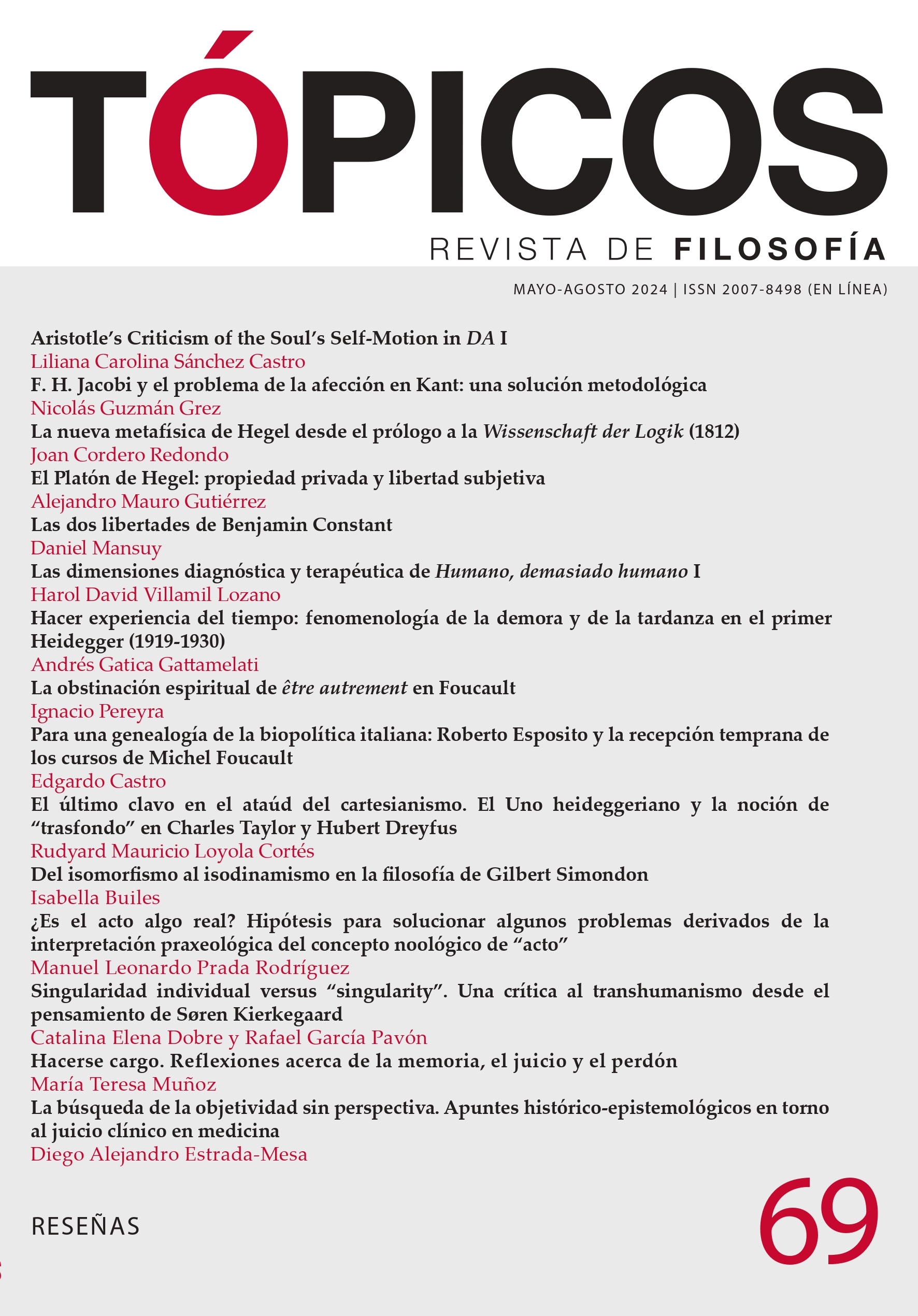F. H. Jacobi and the Problem of Affection in Kant: A Methodological Solution
Published 2024-04-04
Keywords
How to Cite
Copyright (c) 2024 Tópicos, Revista de Filosofía

This work is licensed under a Creative Commons Attribution-NonCommercial-NoDerivatives 4.0 International License.
Downloads
Altmetrics
Citas
Abstract
This paper seeks to describe F. H. Jacobi’s critique of transcendental philosophy concerning the problem of affection and the thing in itself. This critique attributes to Kant’s thought an idealism incompatible with any notion of realism. Jacobi’s interpretation, however, rests on an ignorance of the methodological-transcendental nature not only of the terminology involved in the problem of affection, but of the whole Kantian reflection about knowledge. The exegetical model of the two aspects view has provided instruments that allowed for a hermeneutical reconstruction of the problem of affection and put in evidence the methodological mistake present in Jacobi’s critique.
References
- Adickes, E. (1920). Kants Opus postumum dargestellt und beurteilt. Verlag von Reuther & Reichard.
- Adickes, E. (1924). Kant und das Ding an sich. Pan Verlag Rolf Heise.
- Adickes, E. (1929). Kants Lehre von der doppelten Affektion unseres Ich als Schlüssel zu seiner Erkenntnistheorie. J. C. Mohr.
- Allison, H. E. (1976). The Non-Spatiality of Things in Themselves for Kant. Journal of the History of Philosophy, 14, 313-321.
- Allison, H. E. (1978). Things in Themselves, Noumena, and the Transcendental Object. Dialectica, 32, 41-76.
- Allison, H. E. (2004). Kant’s Transcendental Idealism: An Interpretation and Defense. Yale University Press.
- Ameriks, K. (1982). Recent Work on Kant’s Theoretical Philosophy. American Philosophical Quarterly, 19(1), 1-24.
- Ameriks, K. (2011). Kant’s Idealism on a Moderate Interpretation. En D. Schulting y J. Verburgt (eds.), Kant’s Idealism: New Interpretations of a Controversial Doctrine. (pp. 29-53). Springer.
- Bird, G. (1962). Kant’s Theory of Knowledge: An Outline of One Central Argument in the “Critique of Pure Reason”. Routledge & Kegan Paul.
- Cassirer, E. (1974). Das Erkenntnisproblem in der Philosophie und Wissenschaft der neueren Zeit. Volumen 2. Wissenschaftliche Buchgesellschaft.
- Cohen, H. (1885). Kants Theorie der Erfahrung. Dummler.
- Eisler, R. (1961). Kant Lexicon. Georg Olms.
- Guzmán Grez, N. (2021). Kants Theorie der Selbstsetzung. Versuch über die Epigenesis des transzendentalen Subjekts als Form und Materie der Erkenntnis. Königshausen & Neumann.
- Hartmann, N. (1914). Über die Erkennbarkeit des Apriorischen. Logos, 5, 290-329.
- Herring, H. (1953). Das Problem der Affektion bei Kant. Die Frage nach der Gegebenheitsweise des Gegenstandes in der „Kritik der reinen Vernunft“ und in die Kant-Interpretation. [Ergänzungsheft de Kant Studien, 67]. Kölner Universitätsverlag.
- Hoppe, H. (1969). Kants Theorie der Physik. Eine Untersuchung über das Opus postumum von Kant. Vittorio Klostermann.
- Jacobi, F. H. (1968). David Hume über den Glauben, oder Idealismus und Realismus. En Werke. II. (pp. 1-323). F. Roth y F. Köppen (eds.). Wissenschaftliche Buchgesellschaft.
- Jacobi, F. H. (2018). Brief über den Nihilismus. Frommann-Holzboog.
- Kant, I. (1936). Gesammelte Schriften. Band 21. Opus postumum. 1. Hälfte (Convolut I bis VI). Walter de Gruyter.
- Kant, I. (1938). Gesammelte Schriften. Band 22. Opus postumum. 2. Hälfte (Convolut VII bis XIII). Walter de Gruyter.
- Kant, I. (1991). Transición de los principios metafísicos de la ciencia natural a la física (Opus postumum). F. Duque (trad.). Anthropos.
- Kant, I. (1997). Crítica de la razón pura. P. Ribas (trad.). Alfaguara.
- Kant, I. (1998). Kritik der reinen Vernunft. Felix Meiner.
- Kemp Smith, N. (1962). A Commentary to Kant’s “Critique of Pure Reason”. Humanities Press.
- Paton, H. J. (1936). Kant’s Metaphysic of Experience: A Commentary on the First Half of the Kritik der reinen Vernunft. II. George Allen & Unwin.
- Prauss, G. (1971). Erscheinung bei Kant. Ein Problem der ,,Kritik der reinen Vernunft‘‘. Walter de Gruyter.
- Prauss, G. (1977). Kant und das Problem der Dinge an sich. Bouvier Verlag Herbert Grundmann.
- Rousset, B. (1967). La doctrine kantienne de l’objectivité. L’autonomie comme devoir et devenir. Libraire Philosophique J. Vrin.
- Schulze, G. E. (1911). Aenesidemus oder über die Fundamente der von dem Herrn Professor Reinhold in Jena gelieferten Elementar-Philosophie. Nebst einer Vertheidigung des Skepticismus gegen die Anmaassungen der Vernunftkritik. A. Liebert (ed.). Verlag von Reuther & Reichard.
- Vaihinger, H. (1979). Kommentar zu Kants „Kritik der reinen Vernunft“. II. Scientia Verlag.





